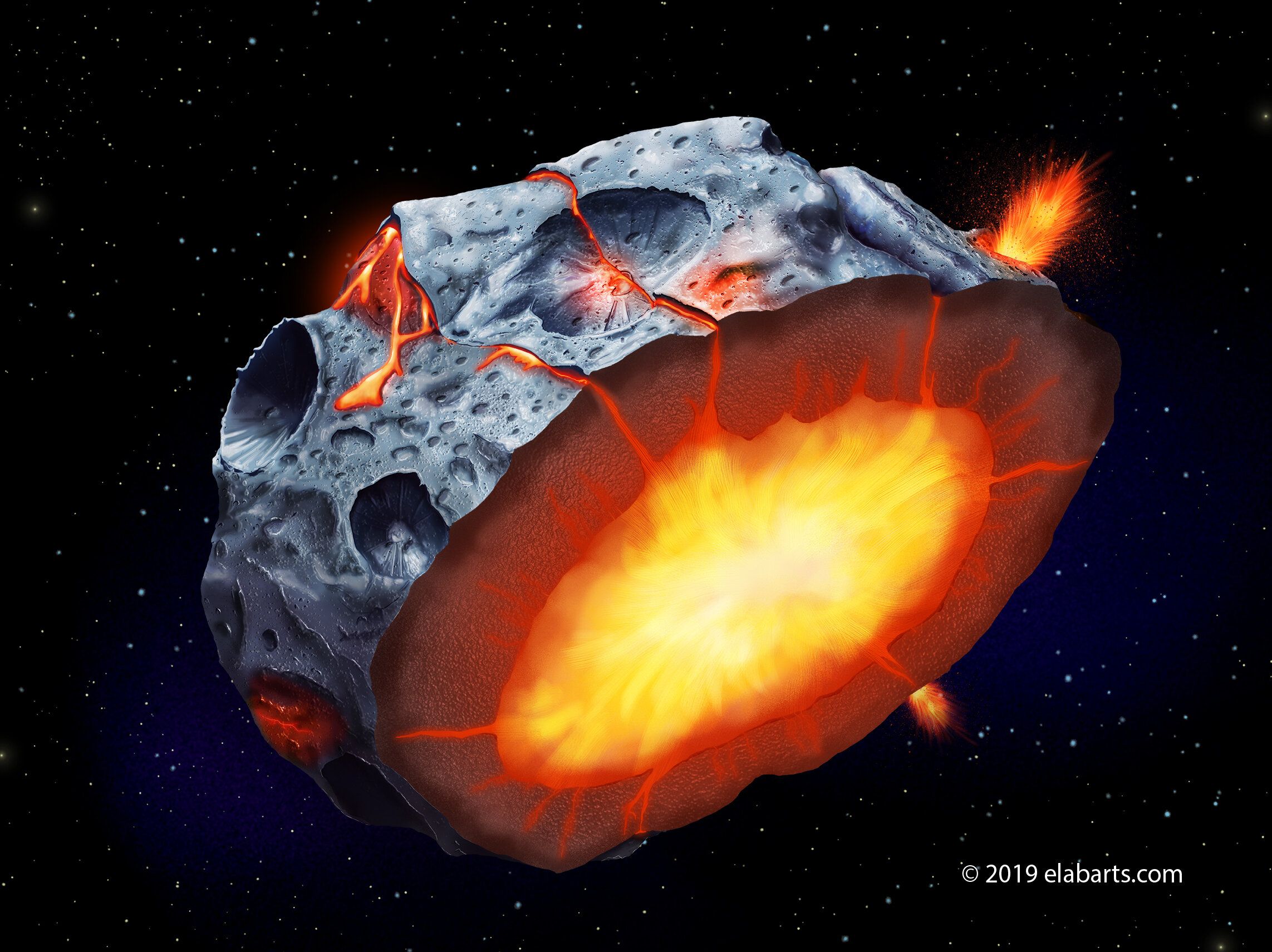
Of the countless asteroids which orbit our sun in the solar system, scientists think that a small proportion—possibly around 3 percent—are thought to be made of metal. And based on our current understanding, these objects began their lives as blobs of molten iron suspended in space.
Now, a team of researchers from the University of California, Santa Cruz, has used computer modeling to simulate the geophysics of such asteroids. The team found that as the metal cooled and solidified, volcanoes spewing out liquid iron could have emerged from beneath a solid crust.
"Metallic asteroids are expected to have been exposed while still molten," the researchers wrote in a paper published in the journal Geophysical Research Letters. "Some would have cooled from the outside in, crystallizing a surface crust which would then grow inward. Because the growing crust is expected to be denser than the underlying melt, this melt will tend to migrate toward the surface whenever it is able."
"We predict iron volcanism to have occurred on metallic asteroids as they cooled and discuss the implications of this process for both the evolution and the modern appearance of these bodies," the authors wrote.
Scientists think that metallic asteroids originated early in the history of the solar system, at a time when the first planets were beginning to form. These "protoplanets" or "planetesimals" sometimes collided with each other, causing them to lose their rocky outer layers and exposing liquid cores containing molten iron. Exposed to the cold of space, these liquid blobs would have cooled and solidified.
"In some cases it would crystallize from the center out and wouldn't have volcanism, but some would crystallize from the top down, so you'd get a solid sheet of metal on the surface with liquid metal underneath," Francis Nimmo, an author of the study, said in a statement.
The researchers suggest that the volcanoes would behave differently, depending on the specific characteristics of the asteroid in question.
"If it's mostly pure iron, then you would have eruptions of low-viscosity surface flows spreading out in thin sheets, so nothing like the thick, viscous lava flows you see on Hawaii," Jacob Abrahams, another author of the study, said in the statement. "At the other extreme, if there are light elements mixed in and gases that expand rapidly, you could have explosive volcanism that might leave pits in the surface."
The UC Santa Cruz scientists became interested in investigating this issue, in part, due to NASA's plans to send a probe to Psyche—the largest metallic asteroid in the solar system.
"Our motivation for doing this work came mostly from the upcoming Psyche mission," Abrahams told Newsweek. "It's scheduled to arrive in 2026, and will mark the first time we ever observe a metallic asteroid up close. In light of that, we thought it would be interesting to think about the evolution and geophysical behavior of a metallic asteroid, and possibly make predictions about what Psyche might see."
While it's not clear what signs of past volcanism could still exist on Psyche or other metallic asteroids, finding them could provide us with fascinating new insights.
"We expect that if space missions are able to study volcanic flows on these asteroids, there is a lot that the flows can teach us about the early behavior of the asteroids," Abrahams said. "For example, we could investigate if these bodies generated magnetic fields and how those fields behaved, we could study what sorts of other elements—especially sulfur—were dissolved in these bodies, and hopefully much more.
"However, our work was very preliminary and we left for future studies most of the work of figuring out how exactly this volcanism would behave, what structures it might form, and whether those structures could survive until the present day," he said.
This article was updated to include additional comments from Jacob Abrahams.
Uncommon Knowledge
Newsweek is committed to challenging conventional wisdom and finding connections in the search for common ground.
Newsweek is committed to challenging conventional wisdom and finding connections in the search for common ground.
About the writer
Aristos is a Newsweek science reporter with the London, U.K., bureau. He reports on science and health topics, including; animal, ... Read more
To read how Newsweek uses AI as a newsroom tool, Click here.








